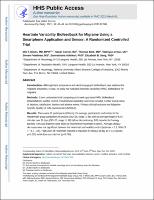Please use this identifier to cite or link to this item:
https://hdl.handle.net/20.500.12202/9410Full metadata record
| DC Field | Value | Language |
|---|---|---|
| dc.contributor.author | Minen, Mia T. | - |
| dc.contributor.author | Corner, Sarah | - |
| dc.contributor.author | Berk, Thomas | - |
| dc.contributor.author | Levitan, Valeriya | - |
| dc.contributor.author | Friedman, Steven | - |
| dc.contributor.author | Adhikari, Samrachana | - |
| dc.date.accessioned | 2023-10-31T17:46:39Z | - |
| dc.date.available | 2023-10-31T17:46:39Z | - |
| dc.date.issued | 2021 | - |
| dc.identifier.citation | Minen, M. T., Corner, S., Berk, T., Levitan, V., Friedman, S., Adhikari, S., & Seng, E. B. (2021). Heartrate variability biofeedback for migraine using a smartphone application and sensor: A randomized controlled trial. General Hospital Psychiatry, 69, 41–49. https://doi.org/10.1016/j.genhosppsych.2020.12.008 | en_US |
| dc.identifier.issn | 0163-8343, 1873-7714 | - |
| dc.identifier.uri | https://www.ncbi.nlm.nih.gov/pmc/articles/PMC8721520/ | en_US |
| dc.identifier.uri | https://hdl.handle.net/20.500.12202/9410 | - |
| dc.description | Scholarly article / Open access | en_US |
| dc.description.abstract | Introduction Although hand temperature and electromyograph biofeedback have evidence for migraine prevention, to date, no study has evaluated heartrate variability (HRV) biofeedback for migraine. Methods 2-arm randomized trial comparing an 8-week app-based HRV biofeedback (HeartMath) to waitlist control. Feasibility/acceptability outcomes included number and duration of sessions, satisfaction, barriers and adverse events. Primary clinical outcome was Migraine-Specific Quality of Life Questionnaire (MSQv2). Results There were 52 participants (26/arm). On average, participants randomized to the Hearthmath group completed 29 sessions (SD = 29, range: 2–86) with an average length of 6:43 min over 36 days (SD = 27, range: 0, 88) before discontinuing. 9/29 reported technology barriers. 43% said that they were likely to recommend Heartmath to others. Average MSQv2 decreases were not significant between the Heartmath and waitlist control (estimate = 0.3, 95% CI = −3.1 - 3.6). High users of Heartmath reported a reduction in MSQv2 at day 30 (−12.3 points, p = 0.010) while low users did not (p = 0.765). Discussion App-based HRV biofeedback was feasible and acceptable on a time-limited basis for people with migraine. Changes in the primary clinical outcome did not differ between biofeedback and control; however, high users of the app reported more benefit than low users. | en_US |
| dc.description.sponsorship | __Acknowledgements__ We would like to thank the following members of the Migraine HeartMath Study Group: Kaitlyn Toy; Jana Jaran; Tyler Gumpel, BS; Seher Ali; Talia Boyers, BA; Fatoumata Sow. Dr. Minen received funding from the NIH NCCIH (K23 AT009706‐01) for salary support. Dr. Minen is also a recipient of the Doris Duke Fellowship to Retain Clinician Scientists. Dr. Adhikari receives research support from the NIH and Johnson & Johnson. Dr. Seng receives research support from the NINDS (K23 NS096107 PI: Seng) and has consulted for GlaxoSmithKline, Eli Lilly, and Click Therapeutics. Dr. Seng has received travel funds from the American Psychological Association, the American Academy of Neurology, the American Association of Pain Medicine Foundation, and the American Headache Society. __Funding:__ This work was supported by the Doris Duke Charitable Foundation (Funds to Retain Clinical Scientists); the NIH NCCIH (K23 AT009706‐01). | en_US |
| dc.language.iso | en_US | en_US |
| dc.publisher | Elsevier | en_US |
| dc.relation.ispartofseries | General Hospital Psychiatry;69 | - |
| dc.rights | Attribution-NonCommercial-NoDerivs 3.0 United States | * |
| dc.rights.uri | http://creativecommons.org/licenses/by-nc-nd/3.0/us/ | * |
| dc.subject | migraines | en_US |
| dc.subject | heartrate | en_US |
| dc.subject | app-based HRV biofeedback (HeartMath) | en_US |
| dc.subject | electromyograph biofeedback | en_US |
| dc.subject | Migraine-Specific Quality of Life Questionnaire (MSQv2) | en_US |
| dc.title | Heartrate variability biofeedback for migraine using a smartphone application and sensor: A randomized controlled trial | en_US |
| dc.type | Article | en_US |
| dc.identifier.doi | https://doi.org/10.1016/j.genhosppsych.2020.12.008 | en_US |
| dc.contributor.orcid | 0000-0002-8938-4949 | en_US |
| local.yu.facultypage | https://www.yu.edu/faculty/pages/seng-elizabeth | en_US |
| Appears in Collections: | Ferkauf Graduate School of Psychology: Faculty Publications | |
Files in This Item:
| File | Description | Size | Format | |
|---|---|---|---|---|
| Seng 021 OA Heartrate variability nihms-1753933.pdf | 544.8 kB | Adobe PDF |  View/Open |
This item is licensed under a Creative Commons License

